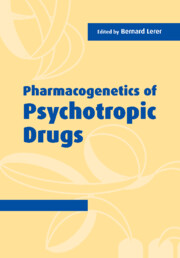Book contents
- Frontmatter
- Contents
- List of contributors
- Part I Introduction
- Part II Clinical background and research design
- 2 From pharmacogenetics to pharmacogenomics of psychotropic drug response
- 3 Neuropsychopharmacology: the interface between genes and psychiatric nosology
- 4 Methodological issues in psychopharmacogenetics
- 5 Statistical approaches in psychopharmacogenetics
- Part III Molecular background
- Part IV Pharmacokinetics
- Part V Specific psychotropic drugs and disorders
- Part VI Pharmacogenetics and brain imaging
- Part VII Industry perspectives
- Index
2 - From pharmacogenetics to pharmacogenomics of psychotropic drug response
from Part II - Clinical background and research design
Published online by Cambridge University Press: 20 August 2009
- Frontmatter
- Contents
- List of contributors
- Part I Introduction
- Part II Clinical background and research design
- 2 From pharmacogenetics to pharmacogenomics of psychotropic drug response
- 3 Neuropsychopharmacology: the interface between genes and psychiatric nosology
- 4 Methodological issues in psychopharmacogenetics
- 5 Statistical approaches in psychopharmacogenetics
- Part III Molecular background
- Part IV Pharmacokinetics
- Part V Specific psychotropic drugs and disorders
- Part VI Pharmacogenetics and brain imaging
- Part VII Industry perspectives
- Index
Summary
OVERVIEW
The marked interindividual variation in response to psychotropic drugs creates a clinical dilemma that can only be resolved through often lengthy empirical drug trials. Recent developments in molecular biology have provided an opportunity to identify molecular genetic predictors of drug response, which may have immediate clinical implications as well as provide critical data for future drug development. In this chapter, we will discuss the evidence for a heritable component to psychotropic drug response, review basic methodological issues in pharmacogenetic studies of psychotropic drug response, and then highlight future directions for pharmacogenetics research in psychiatry.
Introduction
Individual differences in clinical response to psychotropic drugs has long been recognized as a fundamental problem in the treatment of the seriously mentally ill patient. This variability in individual response ranges from patients who experience complete symptom remission to a subset of patients often described as “treatment refractory,” as well as a marked variability in susceptibility to adverse drug effects. A priori identification of the patients who will respond well to a particular psychotropic drug, or be at a higher risk for development of adverse side effects, has the potential to help clinicians to avoid lengthy ineffective medication trials and to limit a patient's exposure to drug side effects. Moreover, enhanced predictability of treatment response early in the course of a patient's illness may result in enhanced patient compliance and willingness to seek treatment rapidly upon symptom exacerbation or recurrence.
Keywords
- Type
- Chapter
- Information
- Pharmacogenetics of Psychotropic Drugs , pp. 21 - 35Publisher: Cambridge University PressPrint publication year: 2002
- 2
- Cited by



